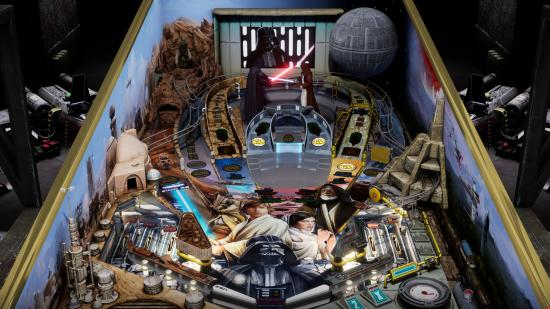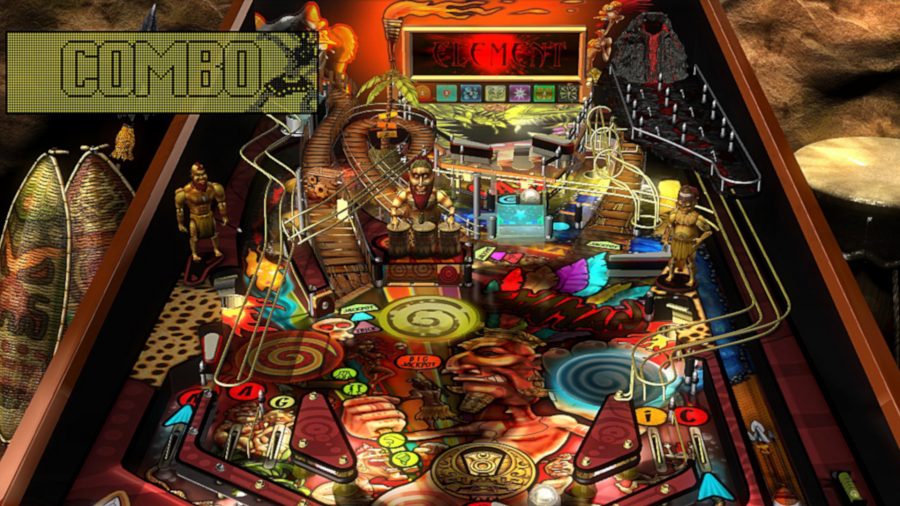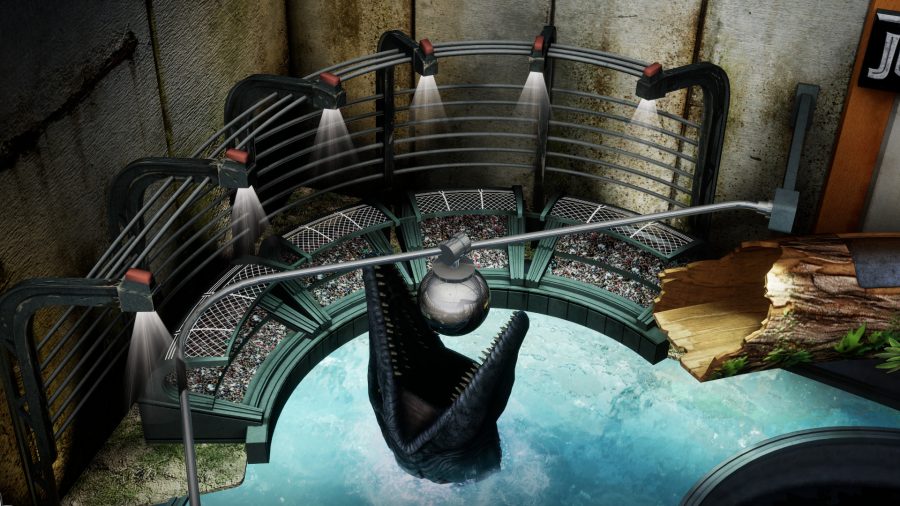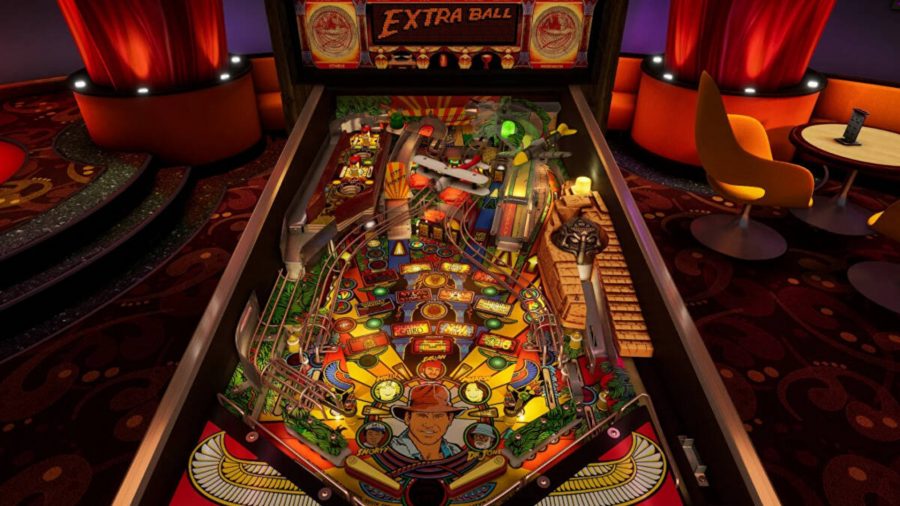I fell in love with pinball in the darkest corner of an American ranch-themed hotel on the grounds of Disneyland Paris in February 2012. I was 19 years old and had, until that frosty day in Paris, never actually played on a real pinball machine. All my experiences with pinball had been in the form of videogames, so pinball always seemed like a quaint fashion — a style of game that designers tried on now and then when they wanted to feel old-fashioned and humble.
Then I played on my first pinball table. It was themed after Peter Jackson’s The Lord of the Rings movies, and it was majestic. When a euro was inserted, the machine burst to life with hundreds of multi-coloured bulbs, still dazzling even though at least half were now out. Distorted renditions of the movie themes blared through loudspeakers, and with each successful hit of the surprisingly big pinball, a character like Gandalf or Frodo would howl an iconic quote in German.
By the time my trip was over, I was more distraught to be leaving that pinball table than I was the French equivalent to the happiest place on Earth. In the airport, I couldn’t stop thinking about it, thinking about how in the world I was going to continue Herr Frodo’s adventures back home – I couldn’t think of a single bar or arcade that had a pinball table in Belfast at all. The solution to my problem came before I had even left France, in a moment so surreal and serendipitous that I had to double-check with witnesses shortly after to make sure it occurred just as it did.
Passing through Charles de Gaulle Airport, upon reaching the final lounge before the departure gate, I noticed a television had been set up in the corner. It had been set there for weary travellers to while away the time and was hooked up to a PlayStation 3. On that screen, just as I arrived with thoughts heavy with pinball, was a pinball game with Spider-Man on it. It was a pinball game by Zen Studios called Marvel Pinball, it was the only game on the machine, and it was how I came to understand why all those designers kept making pinball games.
Ten years later and it’s safe to say my life has changed quite a bit since that trip to Paris. I’ve worked in at least eleven different industries, from construction, to soft furnishing, to whatever Subway qualifies as. In the film industry, I worked on at least ten credited productions. I moved house five times, wrote four feature-length screenplays, made an alt-rock EP, got married, got divorced, got cats; basically, I went full tilt.
For nine of those ten years, however, one thing hadn’t changed — the pinball games by Zen Studios. When I got back from France, I downloaded the original Zen Pinball on my PS3. From there, I went on to play Zen Pinball 2 on my PS Vita and Pinball FX 3 on my PS4 and eventually even on my PS5. Across all of those consoles and all those games, I was able to access every table I had purchased since 2012, thanks to Zen Studio’s honouring previous purchases across all versions.
That is, until the next version of the company’s flagship series, Pinball FX, comes out of early access and onto consoles later this year. On the 15th anniversary of the series it looks as if Zen Studios is going full tilt itself.
With that in mind, I reached out to Zen Studios to ask: what was causing the big change? Why was it happening now?
“I think people look at pinball like it’s easy to understand, it’s flippers and a ball,” COO of Zen Studios Mel Kirk tells The Loadout. “But I think pinball is just as challenging to make as any other game. Zen has always challenged the traditional games space, we’ve done a lot of interesting things first that nobody recognises, and it’s more complicated than it looks.”
Over the last 15 years, Zen Studios has been at the forefront of innovation. With Pinball FX 2, Zen Studios was responsible for the first free download on any console, the first studio to allow in-game content to follow you into the next console generation, and the first to introduce in-app purchases.
However, pushing those last two innovations has recently come to bite Zen somewhat. Pinball FX, which is set for release later this summer, will no longer carry forward tables purchased in previous editions and the in-app purchases will no longer be handled with real-world money, but with an in-game ‘tickets’ currency. Kirk knows these are seen as controversial decisions by some, but Zen is pushing ahead with it anyway.
“It’s going to be a painful message for people no matter how long we offer backwards compatibility,” Kirk says. “They’re going to tell us we’re just terrible, but actually for more core fans, they tell us they get it and they understand that 12 years of backwards compatibility [was] pretty cool.”
Kirk explains that the shift in backwards compatibility came as a result of a change to Unreal Engine. “We could no longer continue with our own engine,” he says. “For years we developed on the PX engine and we just found it too difficult for new console generations to be pushing forward as an engine company and a game company at the same time. So, we moved to Unreal Engine, and unfortunately, the data packet that people purchased on a certain store, it’s just not going to translate.”
Most modern pinball tables don’t penalise you for tilt straight away – you get a warning or two first, to let you know that you’re dangerously close to forfeiting the ball. Zen are pro players, though, so Kirk is well aware that the changes have ruffled some feathers in the community – and while he’s sympathetic to those concerns, he’s sure Zen has made the right decision.
“Some of the changes we made for Pinball FX are real substantial changes in a completely different direction, but I can say, honestly, why else would we be making pinball for over 15 years now? It’s because we love the game, we want it to succeed, we want more pinball players globally, and we think this is a good way for people to be introduced to the game and to continue playing it,” he says. “And sometimes it seems drastic when you’ve been doing something for so long and we change it.
“I think ultimately we’ll end up winning out and people will eventually come to understand why we’ve done what we’ve done.”
All this drama couldn’t be further from how I imagined Zen Studios in my head. From the outside, the only time I had ever been challenged by the company personally was when it expected me to trade in the spongy, responsive flippers from playing Zen Pinball 2 on my PS Vita for the clackity bumpers of Pinball FX 3 on the Nintendo Switch.

Recounting my personal betrayal did bring to mind a feature that hadn’t gone exactly to plan in Pinball FX 3 — full competitive cross-platform play. The game, which released in 2017, came just before Sony had fully opened negotiations on cross-platform play, meaning the company was once again thanklessly ahead of the curve.
“We’re always a little crushed when things don’t work out on our part, but look, we have a certain role to play — can I go to Sony and make it change its mind about something in the name of pinball?” Kirk says before pausing. “Well, actually, we did before with backwards compatibility – there was a custom set-up in the backend of PlayStation Network that they worked with us on. While we try to bend rules – and we’re bending rules again this time around – it’s always nice if we never expect we will be able to do it.”
That bending of the rules was something I hadn’t fully appreciated about Zen’s efforts. It had taken me no time at all in the ten years playing the studio’s games to take for granted that its pinball tables would simply carry over, despite having no other game at the time, and hardly any games even today, that feature that cross-compatibility of content on such a scale. As it happens, the folk behind Zen Studios are masters of nudging.
Nudging, another torturously forced pinball analogy, is a masterful technique pro-players use to keep the ball in play in dire situations without triggering the tilt mechanism. By nudging or sliding the table with just the right amount of force and precision, a player can move the ball without triggering a tilt warning or tilting on any recognisable scale at all. Each table’s sensitivity will vary, as will the player’s skill, but it’s clear that when it comes to changing the game without losing the ball, few have nudged as subtly as Zen.
“We started breaking the rules with what was acceptable for videogame pinball back with The Infinity Gauntlet table in 2012,” Kirk says. “We could flip the whole table upside down and now it’s all inverted and the flippers are inverted, and at first, people were like, ‘Zen, what are you doing? This is not pinball!’ And then everybody was like, ‘wait a minute, this is so cool because we wish that this could happen on a real machine!’ So we started taking more and more liberties and now, so long as new mechanics fit the IP we’re working on, it can happen.”
This trend of change is something Zen has zeroed in on for Pinball FX. “I think it’s our most ambitious yet,” Kirk says. “Not only cross-platform play this time, I want to see cross-play; I wanna see that it doesn’t matter where you bought your pinball table, this is a game that operates differently than most and we think you should be able to play your pinball tables [on all the platforms you own].
“So that’s the mentality going forward. It’s ambitious to try and make it happen, and we’ve bet a lot on it — we’re messaging about it, but the stars are aligning. Can we get all the first parties on board? We’re going to find out!”
While Zen’s entire focus has been on pinball games – it’s not where the team expected to end up. This talented team originally wanted to cash in on pinball’s success, making one game before moving onto another, more unexpected genre.
“Nobody at the company would have told you today that we’d still be working on pinball,” Kirk says. “We thought that it would be a stepping stone for us – we release a good pinball game because that’s what we love to make, and that’ll probably get us enough money to finance our next game. We wanted to work on RPGs.”
It was an admission that reminded me of another company — Digital Extremes. For those who don’t know, the studio behind Warframe was originally known for pinball games in the 90s, before getting involved in Epic’s Unreal series and never really looking back. I brought this comparison up to Kirk, wondering what he made of Zen taking the alternative, pinball-laden path.
“I realised this recently that we’re not just making pinball any longer,” he says. “I mean we are making a pinball game, but Zen has built a pinball business. We have, thanks to our partnership with Arcade1Up, pinball machines in homes which are connected to the internet, and now they want to play pinball tournaments and see what their leaderboard is on their live score. This is where our pinball game has led us to.”
I must stress that when Kirk delivered the following sentence just after that last one, there was not a marked change in tone or a darkness now lingering between us — he truly just sees the bigger picture in all of this. “The thing is, pinball’s been around a lot longer than I’ve been alive, it’ll be here after I’m gone, and I just get to help in a segment of the history of this game. It’s fun.
“It’s funny because the company started in Hungary, in Budapest, and there were four guys at Zen doing tech demos, so we made Pinball FX and we got into Xbox Live Arcade by supporting the Xbox Live Vision camera. We made this stupid little video, I had hulk gloves on and I was hitting the ball using the camera and that’s how we got the attention of Microsoft and we were just shocked at the success but that’s where it all started. Now we’ve been here 15 years and it’s like ‘what happened?’ – it’s insane.”
What would the ultimate reward in pinball-as-metaphor be? Why it could only be wizard mode — pinball’s endgame; a celebration for a game of careful nudges and expert juggling. And if there were to be a reward for the expert managing of pinball video games over the years, it would likely be in the form of dream IPs to work with next. So, we asked Kirk, if money was no object, what would he go for?
“To set the table, our first IP was Street Fighter, and at the time that was the dream,” he says. “And then it was Star Wars, and then it was Marvel, and so we are living our dreams, pretty much every IP we work on is either one of our designers or someone in our team saying ‘that’s my dream IP’.
“Specifically, I would love to do something with Nintendo,” he continues. “Nintendo has a really rich history with pinball games and pinball collaborations and hybrid stuff like Metroid Pinball and Kirby and that’s just something we haven’t done yet, but it would be amazing.”
While it’s clear Kirk is trying to manifest this cross-over, he admits it’s all about being in the right place at the right time. Something Zen Studios has, over the years, been incredibly good at doing.
As we neared the end of our conversation, I decided to shoot my shot: was there any chance my beloved Lord of the Rings table would make the cut someday?
Well, it turns out that over the years, Kirk has met some of the pinball designing greats, like Brian Eddy, George Gomez, and Gary Stern — the latter two of which are still working together for Stern Pinball. And, as it happens, I found after after this interview that it was indeed Stern Pinball that crafted my beloved Lord of the Rings table.
Kirk has yet to return my text messages about whether or not he would badger his contacts at Stern Pinball to get me the real thing. Perhaps it was a touch tactless after I had just asked him to render the machine digitally for me in the upcoming Pinball FX. When it comes to changing things — in this case, the lack of my dream pinball table in my life — perhaps I should learn something from Zen’s approach and nudge rather than tilt.



